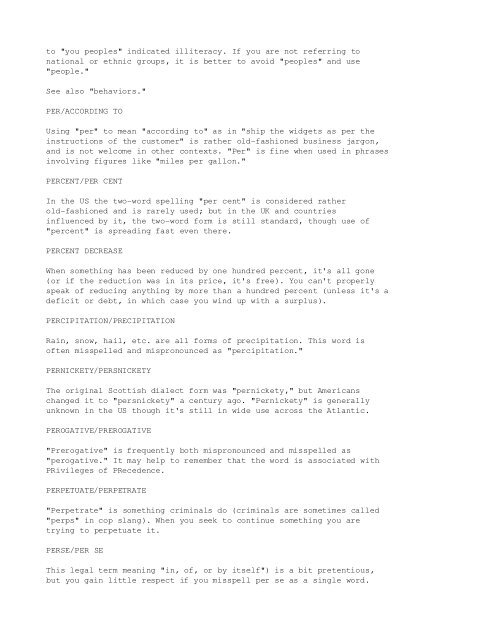Common_Errors_in_English_usage
Common_Errors_in_English_usage
Common_Errors_in_English_usage
Create successful ePaper yourself
Turn your PDF publications into a flip-book with our unique Google optimized e-Paper software.
to "you peoples" <strong>in</strong>dicated illiteracy. If you are not referr<strong>in</strong>g to<br />
national or ethnic groups, it is better to avoid "peoples" and use<br />
"people."<br />
See also "behaviors."<br />
PER/ACCORDING TO<br />
Us<strong>in</strong>g "per" to mean "accord<strong>in</strong>g to" as <strong>in</strong> "ship the widgets as per the<br />
<strong>in</strong>structions of the customer" is rather oldfashioned bus<strong>in</strong>ess jargon,<br />
and is not welcome <strong>in</strong> other contexts. "Per" is f<strong>in</strong>e when used <strong>in</strong> phrases<br />
<strong>in</strong>volv<strong>in</strong>g figures like "miles per gallon."<br />
PERCENT/PER CENT<br />
In the US the twoword spell<strong>in</strong>g "per cent" is considered rather<br />
oldfashioned and is rarely used; but <strong>in</strong> the UK and countries<br />
<strong>in</strong>fluenced by it, the twoword form is still standard, though use of<br />
"percent" is spread<strong>in</strong>g fast even there.<br />
PERCENT DECREASE<br />
When someth<strong>in</strong>g has been reduced by one hundred percent, it's all gone<br />
(or if the reduction was <strong>in</strong> its price, it's free). You can't properly<br />
speak of reduc<strong>in</strong>g anyth<strong>in</strong>g by more than a hundred percent (unless it's a<br />
deficit or debt, <strong>in</strong> which case you w<strong>in</strong>d up with a surplus).<br />
PERCIPITATION/PRECIPITATION<br />
Ra<strong>in</strong>, snow, hail, etc. are all forms of precipitation. This word is<br />
often misspelled and mispronounced as "percipitation."<br />
PERNICKETY/PERSNICKETY<br />
The orig<strong>in</strong>al Scottish dialect form was "pernickety," but Americans<br />
changed it to "persnickety" a century ago. "Pernickety" is generally<br />
unknown <strong>in</strong> the US though it's still <strong>in</strong> wide use across the Atlantic.<br />
PEROGATIVE/PREROGATIVE<br />
"Prerogative" is frequently both mispronounced and misspelled as<br />
"perogative." It may help to remember that the word is associated with<br />
PRivileges of PRecedence.<br />
PERPETUATE/PERPETRATE<br />
"Perpetrate" is someth<strong>in</strong>g crim<strong>in</strong>als do (crim<strong>in</strong>als are sometimes called<br />
"perps" <strong>in</strong> cop slang). When you seek to cont<strong>in</strong>ue someth<strong>in</strong>g you are<br />
try<strong>in</strong>g to perpetuate it.<br />
PERSE/PER SE<br />
This legal term mean<strong>in</strong>g "<strong>in</strong>, of, or by itself") is a bit pretentious,<br />
but you ga<strong>in</strong> little respect if you misspell per se as a s<strong>in</strong>gle word.





